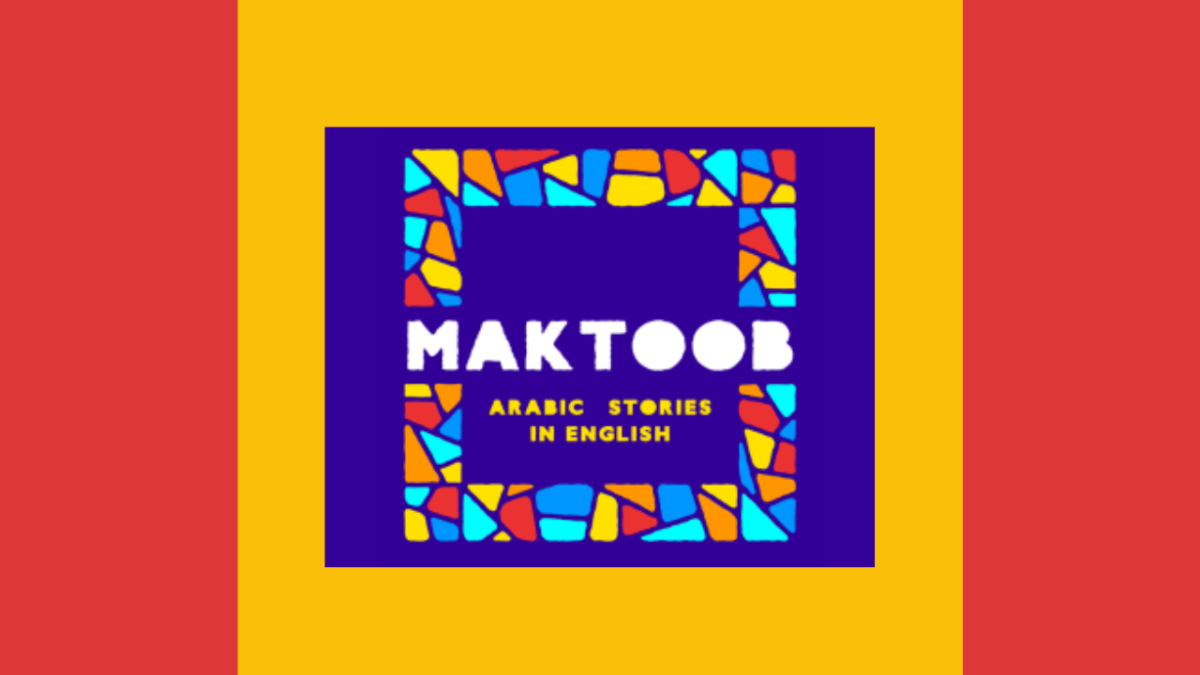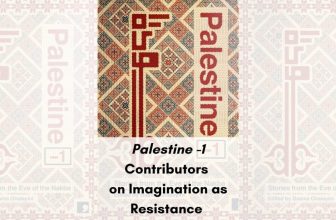
The new podcast MAKTOOB: Arabic Stories in English is coming soon from Komet Kashakeel. You can find a trailer with more about the six-episode podcast, which covers a diversity of books from across the region, on YouTube and Spotify. Here, co-hosts Lauren Pepperell and Anam Zafar talk about how it came about, highlights from the series, and what we might expect from a season two.
How did this idea come about? How did the two of you imagine your audience — or listening community — as you were putting together your list of topics, questions, guests?
Lauren Pepperell: As a book nerd and prolific podcast listener who loves podcasts about books, the motivation behind the series stemmed from my own desire to hear translators talk about Arabic literature, the authors they work with, and their translation choices and processes. The idea started brewing a few years ago when I was just starting out as a translator and also experimenting with some DIY audio projects. I loved translating but had endless questions and was curious to know how other translators were doing it. As I connected with other translators through workshops and groups, I found myself really valuing those conversations.
After an initial failed attempt to find funding, I was fortunate to access a training grant that allowed me to work with mentors in audio production and post-production. I used this as a kind of training ground for the series. I invited Anam Zafar to co-host the podcast with me; I had met her at a translation workshop and appreciated the care she puts into her work—the thoughtfulness behind her translation process, her way with words, and, importantly, what she chooses to translate.
In terms of audience, we wanted the podcast to be an accessible, informal, and conversational introduction to a range of recently translated Arabic works—novels, short stories, poetry, songs—from across the Arabic-speaking world. The aim was to provide snapshots into a diversity of works for a lay but already interested English-speaking audience who may not know much about the vast worlds of Arabic literature, or what kinds of issues, choices, and challenges arise in English translation. However, as soon as we started working on the series, it became obvious that pitching to a lay audience was far too ambiguous (who is the average English reader anyway?). What we really wanted was to create an interesting space for translators and writers to talk to each other about Arabic books in translation, while keeping it open and welcoming to listeners new to this world.
Anam Zafar: This was Lauren’s wonderful idea through and through, and I’m so happy she asked me to collaborate. There’s so much more we can do to spread the word about how many fantastic, varied Arabic books are available to read in English. I’d like our project to add to that conversation, and hopefully the podcast format will help reach new audiences, perhaps book lovers who haven’t (yet!) made Arabic stories in English part of their reading diet.
When I was putting together questions for my episodes (Lauren and I took the lead on different ones) I wanted to first and foremost give the person interviewed a chance to shine: to show off about the importance of the work they are doing as a translator or writer, and the incredible skill and dedication required for that work. Also to give them a chance to “sell” the book they’re talking about in whatever way they would like—to give them an open space to share their feelings and experiences as somebody very close to the book, to sit alongside book reviews and the like.
And speaking of your guests, it seems from a glance that you wanted to cover a diverse range of literary genres and countries. There’s Kuwaiti dystopia, a Lebanese graphic novel, a South Sudanese epic, Egyptian songs, Syrian short stories, and Palestinian poetry. What were you looking for as you shaped your list of potential guests & episodes?
Lauren: In short: diversity. And the longer answer: it was a mix of books, authors, and translators whose work we knew, loved, and valued on a personal level. We wanted a regional spread and a variety of different types of books to give us the opportunity to talk about different contexts, perspectives, styles, and translation questions.
In the first episode, I asked my co-host, Anam, if I could interview her about her translations of a collection of short stories from Syria, as an entry point for us to talk to each other about why we’re doing the series. From there, we looked at different options in different regions. Marrying poetry and Palestine was an obvious choice. I was hit hard by the words of a young, talented poet and author Hiba Abu Nada–killed with her family in their home in the Gaza Strip by Israeli bombs on 20th October, 2023–and worked backwards to find a translator of her work, which led us to Atef Alshaer, who we invited to talk about his contributions to the 2024 Out of Gaza poetry collection.
In episode three, my conversation with Mai Serhan about her twenty-first-century translations of Sayyed Darwish offered a chance to discuss translating old songs while reflecting on the revolutionary legacy of his music over the past century, from the time of the British occupation of Egypt to today. We also decided to dedicate one episode to Anam interviewing the author and illustrator of a graphic novel set in Lebanon. I didn’t know I liked comics until I read Yoghurt and Jam: or How My Mother Became Lebanese, and it was a great opportunity to have a translator and an author/illustrator of a book speak directly to each other.
We wanted to talk about Sudan and invited the brilliant translator Sawad Hussain to speak about the brilliant Edo’s Souls. We just loved that book and also really appreciate the work Sawad does translating books from authors and regions not often translated into English (Sudan, Eritrea, Oman, Yemen…)—as well as her role in mentoring and inspiring so many translators, including ourselves.
We end the series with a dystopian novel, The Book Censor’s Library, published in English last year. It speaks to a topic we thought was so pressing: banning books and all imagination.
Anam: I want this series to show—as ArabLit also does so wonderfully—that “Arabic literature” is not a single, unified entity. Arabic as a language is used across a huge chunk of the world, and literature written in the language reflects that. There is no one country that can represent Arabic literature on its own; no single type of book or story can do that, either. With this short series, we are attempting to do justice to that message. And by showcasing just a small selection of the different types of Arabic stories we already have in English, published by all sorts of houses and translated by just a small group of the cohort of Arabic-English translators who are working today, I hope more publishers will be inspired to commission English translations of Arabic books.
Can you each talk about a few of the highlights? What were some of your moments of discovery, as you recorded these episodes?
Anam: I found the episode with Lena Merhej about her graphic novel Yoghurt and Jam really special. It gave us the chance to revisit the book together—creator and translator (or, one of the translators: Nadiyah Abdullatif also worked with me on it)—now the dust on the translation project has settled. Sure, we asked Lena plenty of questions during the translation process, but the chance to speak together after the rush of deadlines and publication schedules made this conversation different to our other ones: slower, more meandering, and quite vulnerable too, since Lena was joining us from Beirut as Lebanon was still reeling from yet another war. I’m grateful to Lena for opening up to us as she did.
Lauren: It’s hard to choose which highlights to highlight. I loved learning all the backstories behind the books, authors, and translators’ work—getting to know more about how and why they translate or write, what they enjoy, and what they struggle with. And, of course, getting to know their book lists!
What’s gained by working together on this, as two co-hosts, rather than just one of you doing a series of interviews?
Anam: As a fan of co-translation, I am a believer that two brains are better than one for most things, really! Podcast work is creative work, and creativity flows much easier when you have someone else to bounce your ideas off. Since we both gravitate towards different genres when it comes to Arabic literature, working on the podcast together helped us to achieve the variety we were aiming for. Also, it was my first time working on a podcast, so I appreciated being able to lean on Lauren’s experience.
Lauren: Good collaboration is so much better than trying to work it out by yourself. I was excited and relieved when Anam agreed to work on the interviews with me. It was great to share ideas, questions, and reflections—and to be sounding boards for each other, and I am certain the series is better for it. We also had insightful support shaping the episodes from podcast producer Lobna Monieb (Kerning Cultures, Mada Masr, Tarwida Podcast and more). On top of that, I received one-on-one mentoring from Bristol-based post-production specialist Owen Shirely (Paradigm Post), who patiently guided and reviewed my work on audio editing, mixing, and mastering. Others also popped their heads in to help out with different aspects. You’ll hear me say I’m a fan of collaboration several times throughout the series—because, when it works, it’s the best.
Can we expect a season 2 of Maktoob? If so, what are some of the other things you’d like to cover? (And if not, what are some other things you would’ve liked to cover?)
Anam: I would love to make another season! We have so much more ground to cover. If there’s a next time, I’d like to cover some kid lit, as well as more countries whose Arabic literature is perhaps underappreciated. And always, always, more graphic novels.
Lauren: Me too! If we’re lucky with more funding (any leads welcome), I’d love to do seasons 2, 3, 4, and beyond—and create more series centered around different themes, regions, and types of texts: children’s stories, oral histories, memoirs, prison literature, a flashback to early twentieth-century Arabic literary salons, features on areas with little literature translated into English, explorations of dialects and multilingual texts, migration, war, love, and definitely more comics—you name it.










